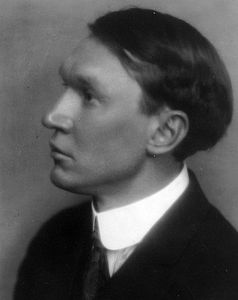Analysis of What The Scare-Crow Said
Vachel Lindsay 1879 (Springfield) – 1931 (Springfield)
The dim-winged spirits of the night
Do fear and serve me well.
They creep from out the hedges of
The garden where I dwell.
I wave my arms across the walk.
The troops obey the sign,
And bring me shimmering shadow-robes
And cups of cowslip-wine.
Then dig a treasure called the moon,
A very precious thing,
And keep it in the air for me
Because I am a King.
| Scheme | XAXA XBXB XCXC |
|---|---|
| Poetic Form | Quatrain |
| Metre | 01110101 110111 11110101 010111 11110101 010101 01110011 011101 11010101 010101 01100111 011101 |
| Closest metre | Iambic tetrameter |
| Characters | 351 |
| Words | 71 |
| Sentences | 6 |
| Stanzas | 3 |
| Stanza Lengths | 4, 4, 4 |
| Lines Amount | 12 |
| Letters per line (avg) | 23 |
| Words per line (avg) | 6 |
| Letters per stanza (avg) | 92 |
| Words per stanza (avg) | 23 |
Font size:
Submitted on May 13, 2011
Modified on March 05, 2023
- 21 sec read
- 477 Views
Citation
Use the citation below to add this poem analysis to your bibliography:
Style:MLAChicagoAPA
"What The Scare-Crow Said" Poetry.com. STANDS4 LLC, 2024. Web. 28 Apr. 2024. <https://www.poetry.com/poem-analysis/37438/what-the-scare-crow-said>.


Discuss this Vachel Lindsay poem analysis with the community:
Report Comment
We're doing our best to make sure our content is useful, accurate and safe.
If by any chance you spot an inappropriate comment while navigating through our website please use this form to let us know, and we'll take care of it shortly.
Attachment
You need to be logged in to favorite.
Log In